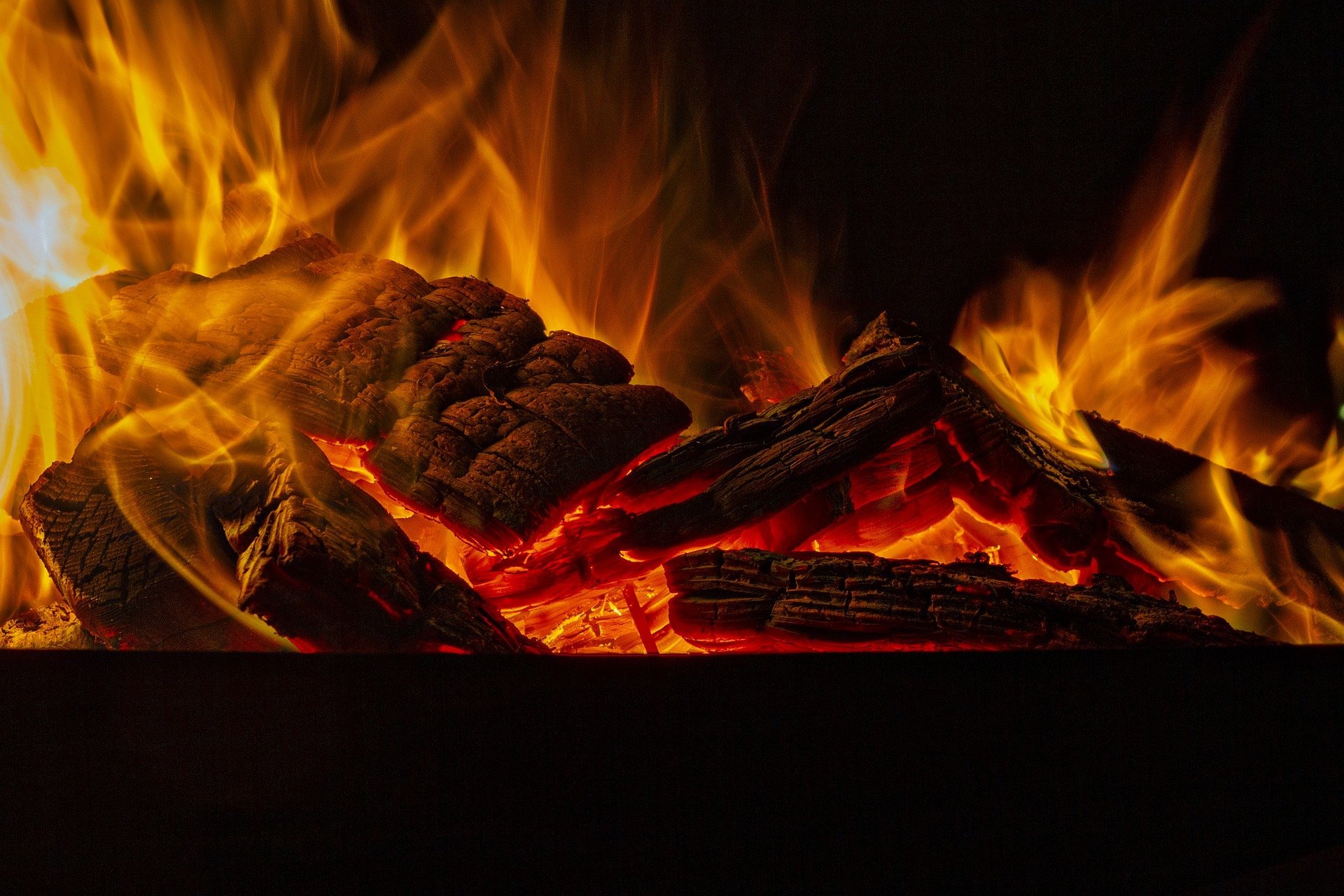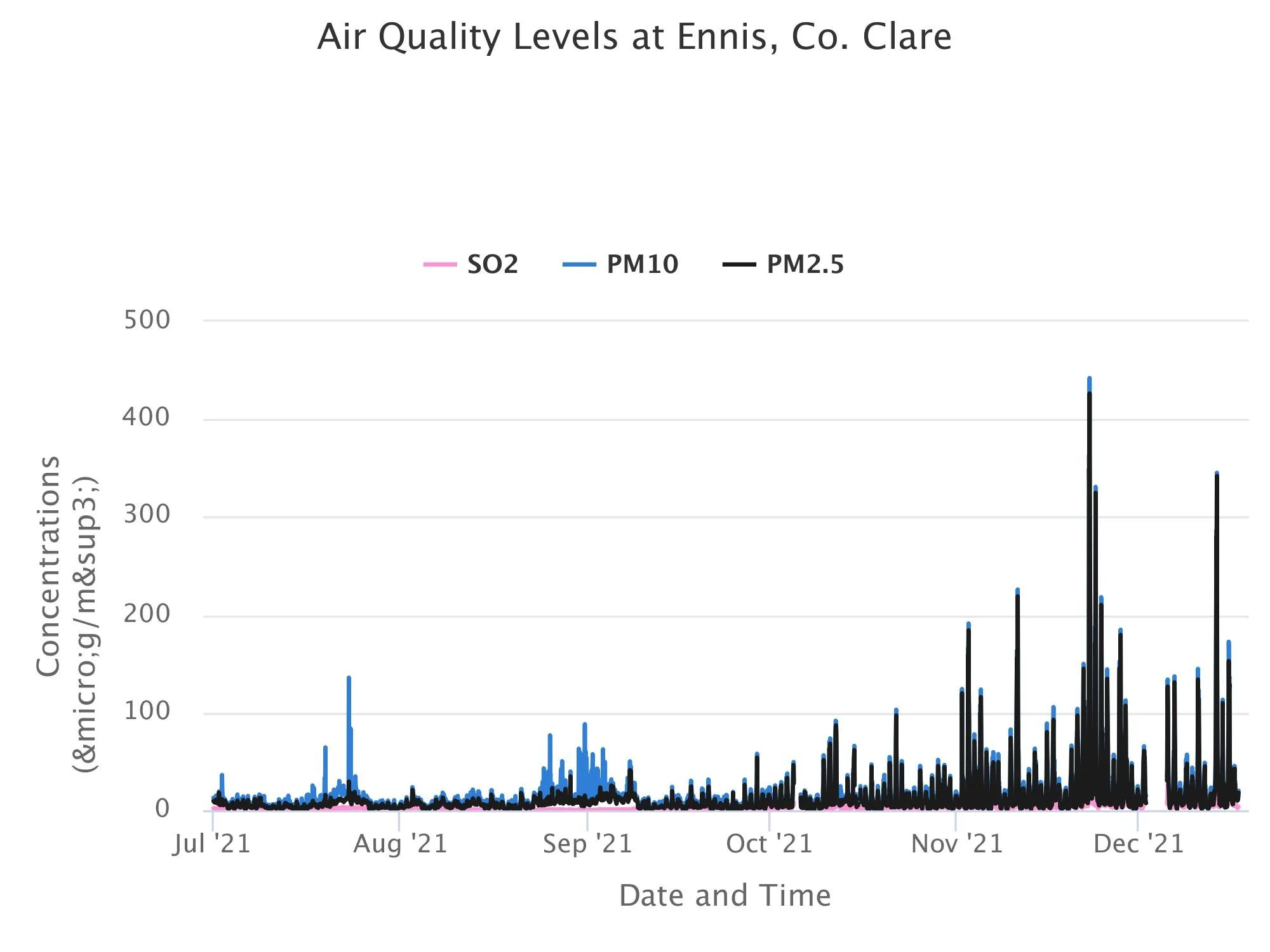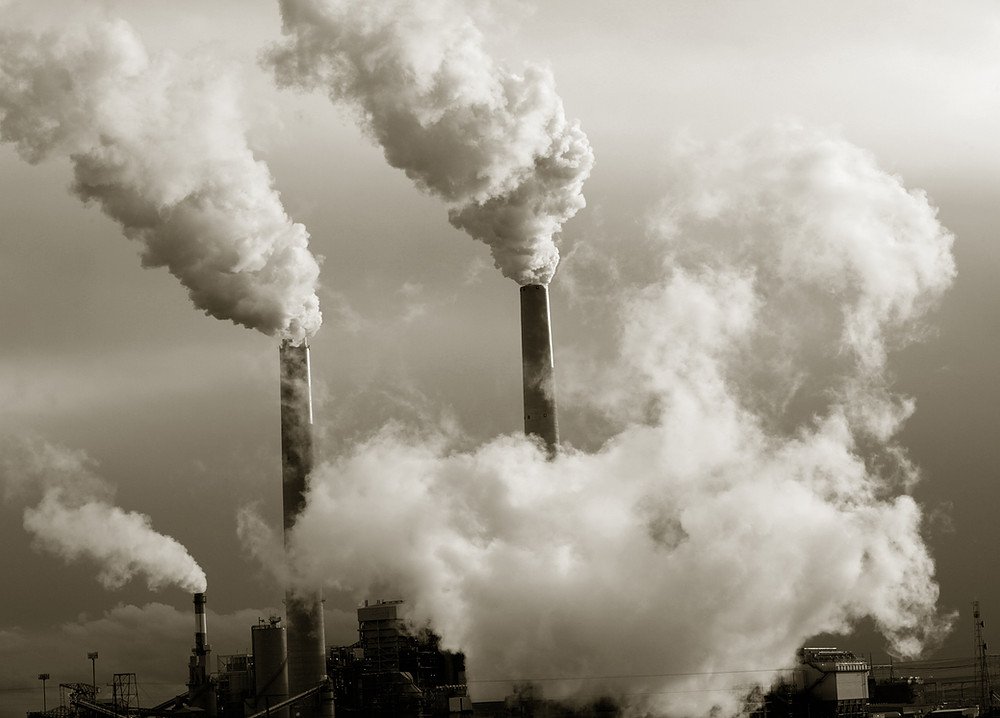
Stop Burning Stuff
There is no silver bullet for solving the Climate Crisis. To overcome the greatest threat known to all life on this planet will require thousands of changes all adding up to a combined solution.
However, if there are two mantras that we have tried to extol through our work in order to promote meaningful change, they would be “do more with less” and “stop burning stuff”.
While the latter can be broadly applied to everything from the extraction and burning of oil for cars, through to the use of kerosene in planes, it also applies to the little actions that thousands of people across Ireland take each day: the decision to light fires.
Today’s article explores the link between fireplaces and worsening both the Climate Crisis and public health.
Cosy vs Cancer
As we rapidly approach Christmas, the image of a roaring fire evokes ideas of cosiness and comfort – in fact, any Christmas card depicting an indoors scene will likely show a blazing fire with stockings hung with care above it.
Fire is an essential part of human mythology the world over, and in Ireland there is not only an emotional attachment to the idea of a fire, but also a cultural one – especially around the smell of turf fires.
However, with the prevalence of radiators, heat pumps, and other forms of internal heating, the decision to light a fire is typically a personal choice. They are not for heat, they are for effect.
This is supported by CSO data from 2017, which showed that 81% of homes in Ireland have access to central heating.
Yet this choice has considerable implications for both the Climate Crisis and public health.
New research from the Foundation for Research and Technology Hellas demonstrates that wood burning stoves in urban areas are responsible for almost half of people’s exposure to carcinogenic chemicals found in air pollution particles, producing more polycyclic aromatic hydrocarbons than diesel or petrol fumes from vehicles.
While this research may have focused on the health implications in Greece, the Environmental Protection Agency in Ireland has also provided startling data closer to home.
Graph showing air quality levels in Ennis. The peaks in sulfur dioxide and particulate matter coincide with the coldest days, typically when temperatures approach freezing. Colder air is more dense, trapping the pollution for longer and exacerbating health concerns. Credit: EPA
The EPA has found that the burning of solid fuels, and the subsequent impact on lowering air quality, is responsible for an estimated 1,300 premature deaths per year.
The situation has got so bad that last month, the Centre for Research into Atmospheric Chemistry at University College Cork advised people to avoid evening walks in areas experiencing poor air quality.
These aren’t rural areas where a single cottage has a small fire as their sole source of warmth, but urban places such as Sligo and Ennis, which have populations of over 19,000 and 25,000 respectively.
Alongside the 1,300 premature deaths in Ireland each year caused by the burning of solid fuels, we also see significant worsening of conditions such as asthma, heart attacks and strokes – with children also significantly affected.
If the Covid-19 pandemic has taught us anything, it has been the act of highlighting how many vulnerable people in society live with these underlying conditions.
Across the country, particulate matter emissions spike in the winter months, fueling 1,300 premature deaths annually. Credit: EPA
This is a solvable problem, and while central heating systems might still be reliant on fossil fuels in the majority of cases, their greater efficiency not only reduces emissions, but also improves public health.
As proven by a 13-year-old study in Tasmania published in the British Medical Journal in 2013, which showed a 28% reduction in wintertime respiratory deaths and a 20% reduction in heart-related deaths simply by incentivising homeowners to switch away from wood heating.
Worsening The Climate Crisis
With the rise of greenwashing, many people in Ireland have been sold a lie: “wood burning is climate-friendly”.
It is not. In fact, in a matter of minutes the burning of wood can release decades of stored carbon into the atmosphere, and in 2018 it was responsible for nearly half the emissions across Europe.
Alongside creating harmful CO2 and particulate matter emissions, burning wood and peat is also depleting the natural world around us – impacting ecosystems and reducing our capacity to store carbon dioxide in bogs and in trees.
Our reliance on burning solid fuels in fireplaces has led to the average Irish home emitting 58% more energy-related carbon dioxide than the average EU dwelling, according to the Climate Change Advisory Council.
This puts us in second place behind Poland for the highest use of solid fuels for heating in Europe.
Couple that with the fact that in 2019 Ireland had the woeful status of having the third highest greenhouse gas emission per capita in the EU – and that the average Irish person has a carbon footprint almost three times bigger than the average person on Earth – and you quickly see that our small nation has a tangible impact on worsening the Climate Crisis.
Arguments that burning locally-sourced turf or wood are cheaper have been widely debunked, with Paul Kenny, then of the Tipperary Energy Agency and now advisor to Eamon Ryan, quoted in the Irish Times in 2019 stating that retrofitting houses saved residents over €1,400 per year.
The SEAI offers grants for solar installation which can offer free electricity and heat, and grants for better insulation in homes and businesses to make them more efficient. We have the tools to solve the Climate Crisis – and it requires being more efficient (‘doing more with less’) and to stop burning stuff.
Peatlands and bogs, like forests, are vital for carbon storage - covering just 3% of the Earth’s surface, but holding nearly 30% of soil-locked carbon. Destroying them to fuel fires worsens the Climate Crisis twofold. Credit: Marcel Silvius, Wetlands International
Stop Burning Stuff
The Irish government has dragged its feet on this issue – as with so many other Climate Crisis issues – with a nationwide ban on smoky coal only due to come into effect in late 2022.
Yet, we are all responsible for our actions in the face of the Climate Crisis, and with the existential threat to all life on Earth that it presents, we must consider which values and cultures are useful for the future – and which must be left in the past.
The sight of a warm fire might be evocative, inviting and welcome, but it also presents significant dangers to our immediate health and the long-term health of our planet.
Remember the context that we find ourselves in: 5 million people are already dying due to the Climate Crisis each year, one-third of all animal and plant life faces extinction by 2070, and 1.2 billion people are likely to be displaced due to the Climate Crisis by 2050.
Do you really need that fire on Christmas day when another 1,300 people will die prematurely due to the emissions from solid fuel burning this year? Is your comfort worth an unliveable planet within our lifetime?
That’s your decision to make.
What To Read Next
Don’t Put Your Faith In Carbon Capture
Carbon capture promises a solution in the face of the Climate Crisis, but in reality is falls far short of the mark, and is even used to justify new fossil fuel projects
There’s No Such Thing As ‘Clean’ Gas
The gas industry in Ireland is engaging in greenwashing to promote renewable gas as a 'clean' solution - when, in reality, it is worsening the Climate Crisis






